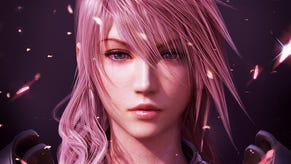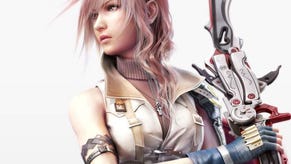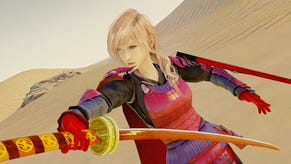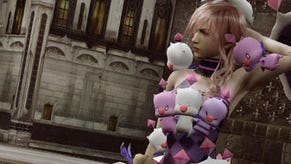Paradigm Shift: Blending Action and RPG in Lightning Returns
Lightning Returns: Final Fantasy 13 gets put through its paces by Alex Donaldson. He reckons it's both new and exciting, contrary to gamer's fears that the trilogy has stagnated. Find out why here.
After extensive hands-on time with Lightning Returns: Final Fantasy 13, I can't help but feel a pang of frustration for what I think the team behind the game are likely to experience with its release. What I played felt a solid and intriguing title that left me eager to see how its mechanics develop over the course of a full game - but I also know many won't give it a chance.
Even the most staunch, loyal members of the Final Fantasy fanbase appear divided by the game - some are desperate to get their hands on it, but a growing number are tired and uneasy. FF built much of its popularity on being fresh. A different world, a different cast - different mechanics, even - with every game.
It's a clever tactic - each game had its detractors, but that crowd could always look forward to the next, all-new entry instead. While the tenth also had a sequel, this generation has seen Square Enix defined by one FF, with the 13th entry becoming a series all of its own.
The detractors of the adventures of Lightning and company are only getting louder and more frustrated with each passing month, and I get the impression interest in the FF13 series is at an all-time low with FF15 now firmly on the radar.
Many want something new - and I can understand that - but perhaps what they don't realize is that the third entry in the FF13 series is in fact, rather new, rather different, and quite exciting.
"We're talking about very fast-paced games," FF13 series Director Motomu Toriyama tells me as he tries to explain the strange action/RPG mash-up system of Lightning Returns in a brief chat after my hands-on time.
"It's got to be very intuitive. It requires a kind of agility and a very quick response... it requires the actual player to have particular skills." He chuckles and shrugs. "That's something that I'm not very good at!
"Playing which involves those quick reflex skills or agility, I'm not very good at all. So I'm not necessarily personally that keen on that style of game."
The solution for Toriyama and his team is a curious one - a system that at its base is evolved from FF13's dynamic-looking turn-based Paradigm System, but is ultimately completely different. Landing in battles is much the same as it was before, but once in an encounter the game is transformed.
Lightning battles alone, and with the player tasked with looking after just one character the game can offer more direct control. Much as in her previous outing, Lightning has access to three pre-set 'classes' of a sort within battle. These come with various costumes attached, reminiscent of FF10-2, but the real feature of the costumes are the abilities each carry.
The abilities players choose for each of their three battle roles are assigned to each of the four face buttons. One I have access to, The Saviour, is the iconic Lightning skill-set - Thunder, Guard, Spark Strike and a Physical attack.
Using each attack costs some of a meter that only recharges when that role isn't in use - the idea being that you'll carefully deplete each role's meter in order before switching to the next role by hitting a shoulder button, reminiscent of FF13's Paradigm Shift.
This leads to interesting possibilities and challenges in my hands-on. When I finally stagger an enemy - a surviving mechanic from previous titles - if I manage to keep the enemy juggled in the air is down only to my button inputs, attack choices and prompt class shifting. All inputs result in instant on-screen action - so it's a far faster paced game than any FF previous.
"In turn-based play after you attack you have to wait," Toriyama explains. "You sit and you wait for the enemy to fight back, and then you can attack them again."
"In the meantime your character is standing still, doing nothing - more than anything, it's very unrealistic to look at. I thought - how can I make this look more realistic? Making it speedier was the answer - and so that's why we made it more fast-paced."
Adding complexity in button presses and reflexes is, of course, dangerous. There's a chunk of FF and RPG fans who enjoy those games because they're frankly rubbish at action-based games. One optional powered-up enemy in Lightning Returns is battering me so badly another journalist at the event leans over and tells me the control input to run away - but me being stubborn, I don't. It takes a Square Enix rep imparting the monster's weakness to even get my foot in the door at damaging him - and even then, my sloppy, newbie inputs aren't cutting it at a slice of the game I'm told is several hours in. Eventually I manage to kill one of the beasts and am quite ecstatic.
While inputs result in immediate action, what is still very traditional in Lightning Returns is that the game is all about meter management. As a lover of fighting games I can get behind this; players need to be constantly aware of the read-outs the packed HUD is giving and switching their actions appropriately. Deep within this game's combat system there's still a kernel of turn-based RPG flair - something Toriyama tells me he hopes will keep the game accessible to those fans.
"I just don't want to make a game where fast button control is everything. I want each player to have time to think - what am I going to do here? Why should I attack this particular monster in this particular way?
"That sort of tactical element is important. We have to find a really good balance between Final Fantasy's traditional tactical gameplay and the excitement you feel with action-packed gameplay. That's something I want to achieve."
Most of my hour with Lightning Returns is in the end spent in combat. It's combat I found exciting, challenging and refreshingly different against more powerful enemies, although when battling weaker foes it does descend into simply hammering the nearest attack until they fall down. Automatic health recovery after each battle only encourages this, as there's no need at all to be careful against less threatening enemies to preserve health.
Other aspects of the game are difficult to judge in a short demo. The Majora's Mask-style countdown is impossible to rule on in this context, while the deep customization of the weaponry, visual style and ability layout of each costume and class also needs more time to grow before it can be fully judged. Both seem promising, and like the combat I'm intrigued to see how deep they are and how fresh they remain over the course of a full-length game.
"We didn't have an awful lot of time," Toriyama admits. "An eighteen month development period. Even though we were quite busy and we had to move from one to the other quite quickly, we just managed to maintain the fresh ideas and the fresh feel of the whole scheme, so we're quite happy about it."
While it's early days, based off my limited hands-on I'm inclined to say that with Lightning Returns Toriyama's team has done a pretty impressive job - more so than the heavily-rehashed FF13-2. In its gameplay and combat this feels like a new, different and above-all exciting game, and a much more comprehensive evolution than FF13-2 offered.
The challenge it faces is winning over fans and players who have grown tired of the characters, story and world of the FF13 series - an ever-growing, incredibly vocal subset of people who have had enough; people who may not try this game even if they should simply because of what it is - another sequel to FF13.
Even if the game fails to win over those players, Toriyama describes it - and the entire FF13 series - as a vital learning experience for Square Enix and his team - and seems more relaxed and at ease now, with his work largely done, than on any other occasion I've interviewed him.
"We spent five years making FF13, and the lesson we learned from that experience is that you have to set out the engine at the earliest possible timing so that later on we wouldn't have to suffer because of things we failed to do early on," he candidly said when asked to describe the most important lesson he's learned.
"In the future when we make more games for next-gen consoles, I think we'll make sure that the engine is there and completely intact at a very early point."
Toriyama pauses, and then there's a smile and a shrug.
"Also, now Lightning is quite a big, famous character," he enthuses. "Possibly even the most famous female in-game character ever. And that's some achievement - we're very proud of it."
Lightning Returns: Final Fantasy 13 launches for PS3 and Xbox 360 in February 2014.








